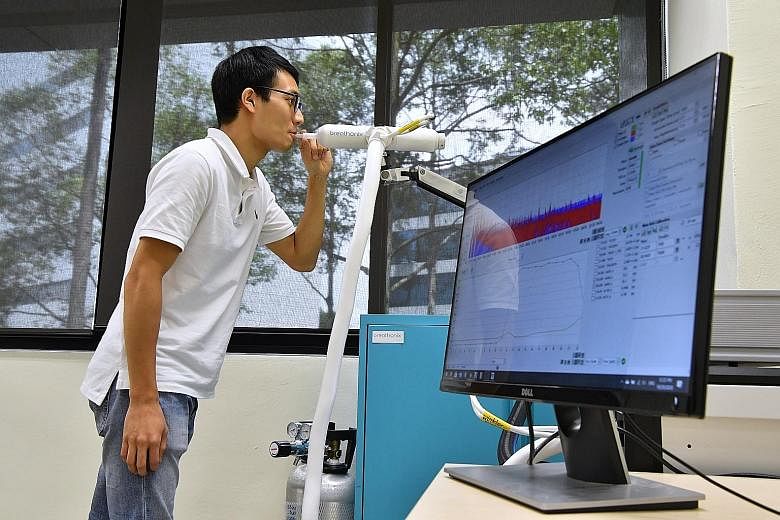Talks are ongoing between the Ministry of Health (MOH) and the developers of a Covid-19 "breathalyser" test kit that gives results in less than a minute to see if the tests can be deployed in public places in the coming months.
The chairman of National University of Singapore (NUS) spin-off Breathonix, Associate Professor Neo Kok Beng, said the firm is also in talks with a "major hospitality player" here to deploy the tests at events such as conferences following approval from the Health Sciences Authority.
The company hopes to receive the approval in the first quarter of next year.
Prof Neo declined to name the hospitality player. He added that Breathonix has also received some requests from groups overseas for the tests to be rolled out there.
For the test, people blow into a disposable mouthpiece that is connected to a breath sampler.
A mass spectrometer analyses the invisible particles called volatile organic compounds (VOCs) in a person's breath.
A healthy person will have a different VOC signature from someone who is ill, and different illnesses produce different signatures.
The results are generated automatically in under a minute, without the need for the sample to be processed elsewhere.
This makes the breath test more convenient and faster than the current polymerase chain reaction (PCR) swab tests, which require an external laboratory to process samples, and take a few days for results to be returned.
The results of Breathonix's test are also generated faster than those of antigen rapid tests (ART), which take at least 15 minutes to be known.
The breath test is also non-invasive, in contrast to the PCR tests and ARTs which require swabs to be inserted into a person's nostrils and have been known to cause discomfort.
-
6
Maximum number of months the machine can run non-stop, 24 hours a day, before it needs to be re-calibrated, said Associate Professor Neo Kok Beng,the chairman of Breathonix.
Additionally, unlike a PCR test which requires skilled laboratory technicians to process samples, Breathonix's machine requires only about an hour of training for a layman to operate, said the company's chief operating officer and co-founder, Mr Du Fang.
"Technically, anyone who knows how to operate a PC can do it," he added.
At its recent successful trial at the National Centre for Infectious Diseases, the breath test also managed to pick up asymptomatic patients - although Dr Jia Zhunan, chief executive and co-founder of Breathonix, cautioned that further studies are needed.
It has a 93 per cent sensitivity rate - the rate at which positive cases are correctly picked up - and a 95 per cent specificity rate, which refers to the proportion of people who are virus-free who are correctly identified as such.
In comparison, the ARTs used at a recent pre-event testing pilot here had a sensitivity rate of about 82 per cent and a specificity rate of 99 per cent.
The breathalyser is less sensitive than a PCR test, which is considered the "gold standard" of Covid-19 detection here, but Dr Jia pointed out that the breath test is not meant to be a diagnostic one.
"We're not comparing or competing against the PCR test. The breath test is more of a first-level screening device," she explained.
The exact cost of a breath test here will depend on several factors, including the number of tests conducted, but Prof Neo said that if around 5,000 people are tested per month using one machine, each test should cost around US$20 (S$27).
Currently, a PCR test here is estimated to cost around $200 per person. Mr Du added that as ARTs are currently still under validation here, it is not known how much such tests cost.
Dr Jia said that there are several measures in place to prevent cross-contamination when using the machine. These include using a disposable mouthpiece and disposable tubing, a one way valve, and a filter on top of the mouthpiece so only gas-based molecules can enter the device.
In addition, all surfaces inside the machine in contact with the breath are heated to a high temperature and are self-sanitising.
Prof Neo added that the machine is able to run non-stop, 24 hours a day, for up to six months before it needs to be re-calibrated.
This, combined with the quick and painless testing method, makes it ideal for deployment at places with a high traffic flow such as airports.
He said: "If you ask people to stay another two days or even 10 hours at the airport (while waiting for test results), that is not going to be encouraging... so we have to look at the bigger picture. Rather than saying this is just a test, (we can ask) how does it facilitate the reopening of the economy?"


